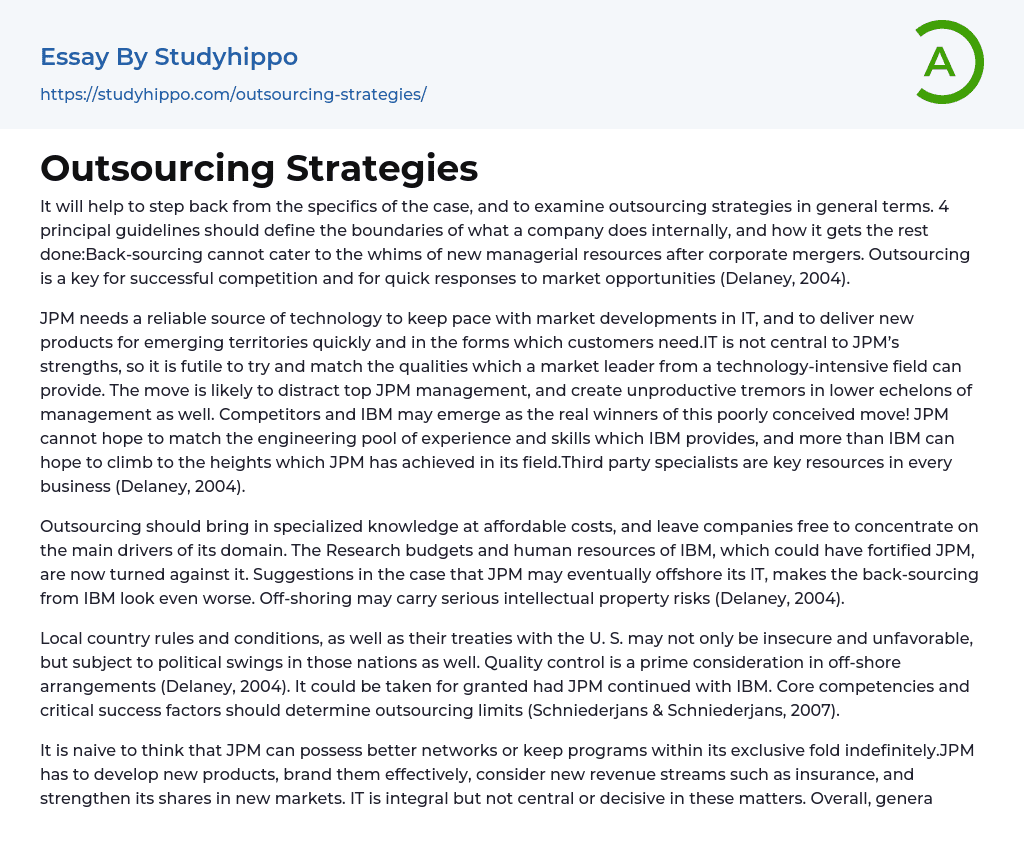Examining outsourcing strategies in general terms is beneficial in understanding the case. There are four primary guidelines that should dictate a company's internal operations and outsourcing practices. Back-sourcing cannot be influenced by new managerial resources after corporate mergers. Successful competition and swift responses to market opportunities rely on outsourcing (Delaney, 2004).
JPM requires a dependable source of technology to keep up with IT advancements and quickly deliver new products to emerging markets in customer-preferred formats. However, technology is not a primary strength of JPM, and striving to match the capabilities of technology-driven market leaders would be futile. This move could distract higher-level JPM management and create unproductive disturbances in lower management levels. As a result, competitors and IBM may reap the benefits of this ill-conceived decision. JPM cannot expect to match IBM's pool of engineering
...experience and skills, just as IBM cannot aspire to reach the peak achievements JPM has attained in its field. The use of third-party specialists is essential for every business (Delaney, 2004).
The purpose of outsourcing is to obtain specialized expertise at reasonable rates, while allowing businesses to focus on their core strengths. Unfortunately, in the case of JPM and IBM, this resulted in a depletion of the latter's research funds and human capital. The suggestion that JPM might eventually move its IT offshore makes IBM's back-sourcing appear even more detrimental. This is because outsourcing may pose significant risks to intellectual property (Delaney, 2004).
Offshore arrangements are influenced by local country rules, conditions, and treaties with the U.S., which can be insecure and unfavorable. Additionally, political swings in these nations can further complicate things. Quality control is a crucial factor in offshoring, as asserted
by Delaney (2004), and it could have been taken for granted if JPM stuck with IBM. The determined outsourcing limits should be based on core competencies and critical success factors, according to Schniederjans and Schniederjans (2007).
In thinking that JPM can maintain better networks or indefinitely keep programs exclusive, it is naive. JPM must develop new products, give them strong branding, explore additional revenue streams like insurance, and solidify its position in new markets. While IT is important, it is not the main factor in these areas. Outsourcing principles and JPM's specific operating environment do not support back-sourcing from a pioneering and leading IT company. This action undermines JPM's execution of its business policies.
In the foreseeable future, the interaction between financial services, IT, and outsourcing may be more of a reactive move rather than a visionary one.
- Chief Executive Officer essays
- Convenience Store essays
- Firm essays
- Training And Development essays
- Unilever essays
- Variable Cost essays
- Virgin Group essays
- Bargaining essays
- Entity essays
- Pest analysis essays
- Being A Leader essays
- Servant Leadership essays
- Leadership Experience essays
- Leadership Qualities essays
- John Locke essays
- 9/11 essays
- A Good Teacher essays
- A Healthy Diet essays
- A Modest Proposal essays
- A&P essays
- Academic Achievement essays
- Achievement essays
- Achieving goals essays
- Admission essays
- Advantages And Disadvantages Of Internet essays
- Alcoholic drinks essays
- Ammonia essays
- Analytical essays
- Ancient Olympic Games essays
- APA essays
- Arabian Peninsula essays
- Argument essays
- Argumentative essays
- Art essays
- Atlantic Ocean essays
- Auto-ethnography essays
- Autobiography essays
- Ballad essays
- Batman essays
- Binge Eating essays
- Black Power Movement essays
- Blogger essays
- Body Mass Index essays
- Book I Want a Wife essays
- Boycott essays
- Breastfeeding essays
- Bulimia Nervosa essays
- Business essays
- Business Process essays
- Canterbury essays




